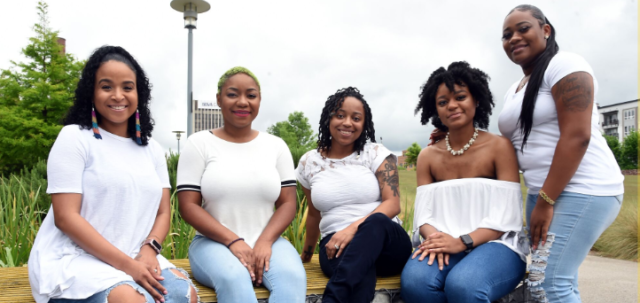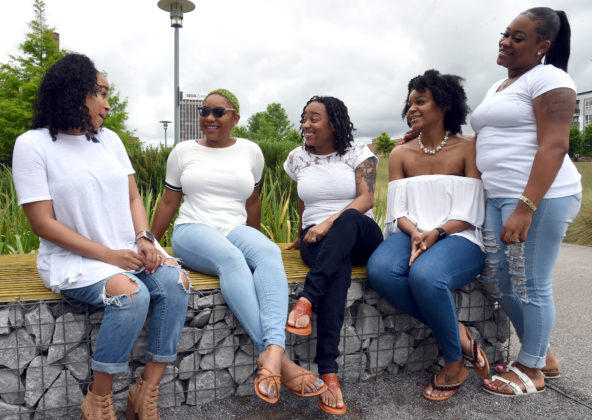By Je’Don Holloway Talley
For the Birmingham Times
Sacorya Adams, a 28-year-old McCalla resident and mother of two daughters, is passionate about breastfeeding.
“Breastfeeding has helped my daughters tremendously,” she said of 5-year-old Jordyn and 4-year-old Journei. “It’s much better for their immune systems. Neither of my girls has had any health issues.”
Plus, breastfeeding gives her children the “best nutrients money can’t buy,” Adams said.
Despite the many benefits of breastfeeding, African American mothers have the lowest rate of breastfeeding initiation and duration. According to the Centers for Disease Control and Prevention (CDC), the percentage of women who initiated breastfeeding was 64.3 percent for African Americans, 81.5 percent for whites, and 81.9 percent for Latinas.
Birmingham-based Chocolate Milk Mommies (CMM), of which Adams is a member, wants to change that. The group believes “Breastfeeding is a mother’s choice. It’s not dirty [or] shameful, and [it] should … be done in a way that reflects [the comfort levels] of mommy and baby.”
CMM was established in 2017 by seven women: founder Angel Warren and members Charity Moore, Jennifer Miller, Rauslyn Myree-Davis, Tiffany Campbell, Elyce Burton, and Adams. The group’s main goal is to provide lactation support for black mothers.
Three years ago, Warren says she was looking for a group for black women interested in breastfeeding but didn’t find any. CMM now fills that void. The CMM Facebook group, which now has 870 members, holds daily forums through which women discuss many of the difficulties mothers experience while breastfeeding and get solutions to overcome them.
CMM is a sisterhood that offers community support and educational resources that promote the benefits of breastfeeding and breast milk for the baby. Here are a few of their stories.
Warren
Greater awareness is needed anytime it’s believed that “black women actually produce chocolate-like milk,” said Warren, 28, a Bessemer resident, who has a 2-year-old daughter, Laila, with husband Gary.
“That’s how I came up with the name,” she said, adding that she knew there was a need for CMM when, even as a nurse, she knew little about breastfeeding prior to becoming a mom.
Warren still breastfeeds her nearly 2-and-a-half-year-old: “My daughter was strictly breast milk for 15 months because she didn’t want solids but was still growing and meeting milestones.”
Warren, a registered nurse at an area health clinic, said she’s passionate about “showing moms that breast milk is liquid gold and provides so much nutrition for baby.”
Even some formula companies try to mimic the nutrients provided in breast milk, Warren said.
“[Breast milk] scientifically is proven to reduce breast and ovarian cancers in moms and reduce obesity, hypertension, and numerous other diseases in children [because] it creates antibodies to protect the baby’s [health].”
Moore
“For mothers, breastfeeding encourages a stronger bond with the baby,” said Moore, 28, a Grayson Valley resident and single mother of a 2-year-old son. “Your baby is listening to your heartbeat, your breaths, your tone of voice, your scent. [Your baby] finds comfort in you and develops emotional bonds and security within you.”
At the same time, breastfeeding moms release beta-endorphin, “a hormone that encourages you to respond to your baby’s needs and creates feelings of pleasure and calmness,” explained Moore, a certified breastfeeding educator, who is pursuing a Bachelor of Science in Midwifery from the Midwives College of Utah. “[The hormone] has anti-anxiety and anti-depressive properties.”
CMM’s mission is to provide evidence-based resources and supportive methods to encourage more black women to breastfeed, Moore said.
“By encouraging more black women to breastfeed, we also improve our [community’s] overall health and reduce health disparities for both mom and baby.”
Moore wants to increase her advocacy for black women and children, which is why she volunteers her time with the CMM group and is also studying to become a doula, a companion who supports a birthing person during labor and birth. “Birth doulas are trained to provide continuous, one-on-one care, as well as information, physical support, and emotional support to birthing persons and their partners” before, during, or after childbirth.
Doulas reduce the risk of medical intervention and provide medication-free pain relief during labor. Having a doula present at childbirth also increases the likelihood of maternal and infant survival from birth-related complications.
Nationwide, according to the Centers for Disease Control and Prevention (CDC), the maternal mortality rate for African American women is much higher than the rate for white women. Last week, the agency reported that African American, Native American, and Alaska Native women die of pregnancy-related causes at a rate about three times higher than those of white women.
“[Because] black women are more likely to die during childbirth, I hope that through sharing my services and knowledge, [black women] realize doulas are not a luxury. We’re necessary to save their lives and their children,” Moore said.
As for her family, Moore can see the positives breast milk has had on her son.
“At almost 2-and-a-half years old, [he] has reached developmental milestones comparative to [those of] four- to six-year-olds,” she said. “He has an extensive vocabulary, speaks multiple languages, knows American Sign Language, and enjoys reading [time] because that’s what I do while he nurses. I wholeheartedly believe breastfeeding provided that foundation.”
Campbell
“Breastfed babies are typically healthier, have higher IQs, and are more independent in the long run,” said Campbell, 25, a Birmingham resident and single mom to 17-month-old daughter Gnilaeh (“healing” spelled backward). “Breast milk is a superfood that contains every vitamin, mineral, antibody, carb, protein, and fat your baby needs.”
Campbell, who earned a bachelor’s degree in psychology from UAB is a case manager at the Jefferson County Intellectual and Developmental Disabilities Authority Inc. (JCIDDA), added, “The chances of mothers that breastfeed getting breast cancer and other reproductive cancers are drastically decreased and [they] typically have lower rates of postpartum depression. [Nursing] mothers also burn more calories daily.”
“[CMM] provides education to black mothers who would not otherwise have anything specifically targeted toward them,” said Campbell — who considers herself a “lactivist,” or vigorous advocate for breastfeeding women — who is in the process of earning her lactation counselor certification this summer.
“We go into local hospitals and moms’ homes when they are experiencing breastfeeding issues. We host a mommy-meet-up on Mondays that provides a sense of community and sisterhood for black moms. … There’s nothing like knowing you won’t be the only black person in the room and that there are other women who can actually relate to you,” Campbell said.
Miller
“Our whole goal is to empower breastfeeding mothers and the urban communities in which they live, [providing] the services and skills they need to be productive [in breastfeeding],” said Miller, 28, a Hoover resident, wife to husband Alvin, and mother to 2-year-old Zander and 1-month-old Zola. “It is also our hope, in the future, to expand into other counties and reach even more black mothers in underserved communities.”
Miller explained that breastfeeding moms often encounter complications they’ve never faced before.
“Before I met the other founders of CMM, I was the first in my family to breastfeed past six months,” she said. “A lack of resources can lead to misdiagnosis like tongue tie, [a condition where a thick band of tissue connects the bottom of the tongue to the floor of the mouth, restricting its movement],” she said, adding that her own traumatic experiences during pregnancy led her to make sure black mothers would never have to go through what she went through.
To learn more about how the delivery of Miller’s first child gave birth to her advocacy and hear more about breastfeeding among African American women, check out the “Let’s Talk Breastfeeding with Jennifer Miller” podcast.
Adams
Adams, a Jess Lanier High School grad who is CEO and owner of the PUSH Adult Group Home, said she still nurses her 4-year-old daughter.
“[Many] moms ask how me how I still manage to breastfeed [her], and I love providing them with the knowledge and information they need to feel comfortable about [nursing] their toddlers,” she said, adding that she offers general information on how to take in enough calories for both mom and a child that age, as well as ways to avoid bites, nipple irritation, and other issues.
Adams, a single mom of two, was inspired to join CMM “because I was willing to show the world that black women do breastfeed and toddlers can still get breastfed,” she said.
“Once CMM [started to] express that breastfeeding was socially [acceptable], more black women seemed to have built their confidence in doing it, despite negative [comments] about it [from others].”
Moms who breastfeed experience an “almost overwhelming sense of love and a strong desire to protect the health [of their babies],” Adams said.
Click one of the names to check out stories about CMM members Myree-Davis and Burton in the Birmingham Times. Learn more about CMM on Facebook and Instagram @ChocolateMilkMommies.
The group meets the first Monday of each month at University of Alabama at Birmingham (UAB) Medical West in Bessemer and every second Monday of each month at East Lake United Methodist Church; gatherings at both locations begin at 5 p.m.














